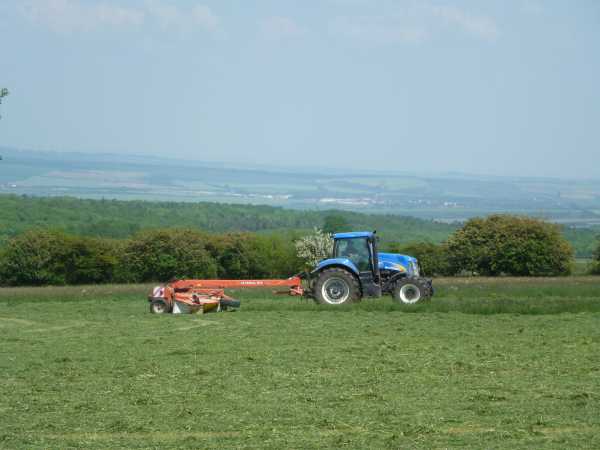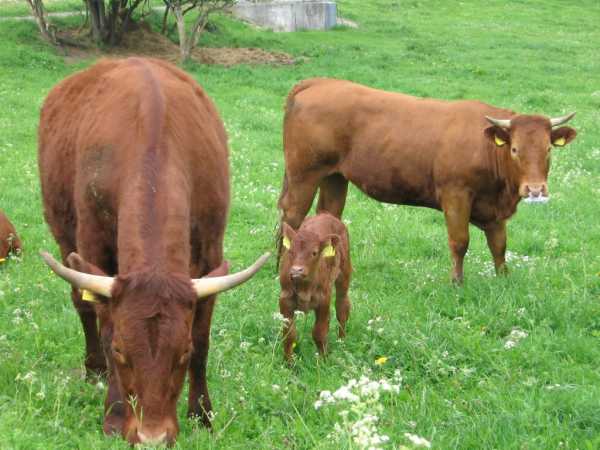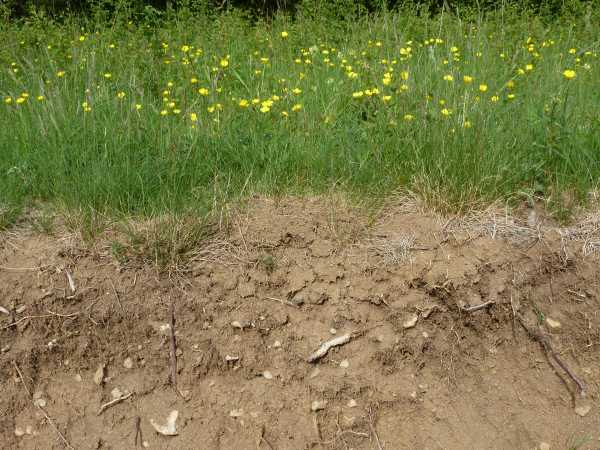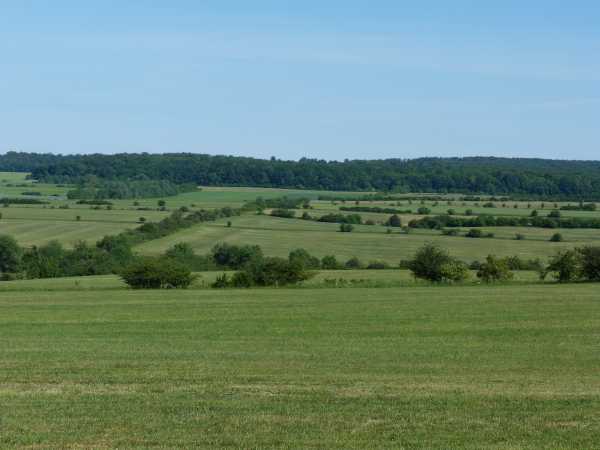ServiceGrass: Effects of organic farming on private and public ecosystem services and grassland multifunctionality
Context
Ecosystem services are the basis to secure human well-being. Grassland is known to potentially deliver an outstandingly high number of different ecosystem services to society. Sustainable agriculture must deliver not only private ecosystem services such as market goods but also many public ecosystem services, i.e. non-market goods and services such as recreation and carbon storage. Agricultural intensification usually increases private ecosystem services but impairs the delivery of many public services. As organic farming has the potential to decrease negative environmental impacts of intensive food and feed production, it might be able to sustain the provision of both private and public ecosystem services. However, this has never been assessed comprehensively for grasslands, although these constitute the largest share of organically managed land in Switzerland but also worldwide.
Project aims
The overall aim of the project is to assess and explain effects of organic grassland farming on several ecosystem services and their simultaneous provisioning, i.e. ecosystem service multifunctionality. Therefore, we will measure and compare the ability of Swiss organic and conventional grasslands to deliver different ecosystem services in relation to plot-scale grassland management. We also aim at upscaling the impact of grassland management on ecosystem services from plots to entire farms by using the Swiss Farm Accountancy Data Network. Using this database will also enable us to assess the economic dimensions of ecosystem services delivery by the two farming systems. Outcomes of the project will reveal strengths and weaknesses of organic and conventional farming in delivering private and public ecosystem services and help to improve grassland farming for a sustainable future. Results will be communicated to different stakeholder groups and society through many different outreach activities.
SoilServiceGrass
Due to the high relevance of soils, their biodiversity and functioning, for grassland-based ecosystem services, the pancivis Foundation Liechtenstein funded an additional one-year project focussing on soil processes and soil microbial diversity. We will assess microbial abundances and diversity as well as root biomass together with Martin Hartmann (ETH Zürich). These analyses will help to evaluate the effects of land use intensification and farming systems on belowground ecosystem properties and processes. This will allow for a particularly comprehensive assessment of the mechanistic impact of organic versus conventional farming on ecosystem services from grasslands.
Timeframe
2019-2023
Publications
Schaub S, El Benni N, Pierrick J, Huguenin-Elie O, Richter F, Klaus VH (2025) Optimizing land-use strategies to improve grassland multifunctionality. Land Use Policy 153: 107548, doi: external page 10.1016/j.landusepol.2025.107548
Mayerhofer J, Richter F, Fox A, Widmer F, Lüscher A, Klaus V, Hartmann M (2025) Impact of grassland management intensity on associations between bacterial, fungal and plant communities. European Journal of Soil Biology 126: 103754, doi: external page 10.1016/j.ejsobi.2025.103754
Le Clec'h S, Huber R, Finger R, Delore J-M, Richter FJ, Klaus VH
(2026) Spatial arrangement of action-oriented versus hybrid agri-environmental schemes: implications for the optimisation of grassland ecosystem services. Agricultural Systems 231: 104490, doi: external page 10.1016/j.agsy.2025.104490
Richter FJ, Feola Conz R, Lüscher A, Buchmann N, Klaus VH, Hartmann M (2024) Interacting management effects on soil microbial alpha and beta diversity in Swiss agricultural grassland. Applied Soil Ecology 203: 105650, doi: external page 10.1016/j.apsoil.2024.105650
Richter F, Suter M, Lüscher A, Buchmann N, El Benni N, Feola-Conz R, Hartmann M, Jan P, Klaus VH (2024) Effects of management practices on the ecosystem-service multifunctionality of temperate grasslands. Nature Communications 15: 3829, doi: external page 10.1038/s41467-024-48049-y
Klaus VH, Richter FJ, Buchmann N, Hartmann M, Lüscher A, Huguenin-Elie O (2024) Indicators for assessing the multifunctionality of agriculturally used grasslands. Ecological Indicators 169: 112846, doi: external page 10.1016/j.ecolind.2024.112846
Klaus VH, Richter F, Lüscher A, Buchmann N, Delore J-M, le Clec'h S (2024) Organic farming is more related to topography than to soil characteristics in extensively and intensively managed grasslands in Switzerland. Agriculture, Ecosystems and Environment 376: 109242, doi: external page 10.1016/j.agee.2024.109242
Klaus VH, Lüscher A, Richter F, Huguenin-Elie O (2024) What information is needed for upscaling grassland ecosystem services to landscape scale? Grassland Science in Europe 29: 546-549, external page Proceedings of the 30th General Meeting of the EGF
Wittwer R, Klaus VH, Richter F, van der Heijden MGA (2024) Ökosystemleistungen und Multifunktionalität in der Landwirtschaft messen und bewerten. Agroscope Science 182, doi: external page 10.34776/as182g
Klaus VH (2023) Pitfalls in global grassland restoration challenge restoration programs and the science-policy dialogue. Ecological Indicators 149: 110185, doi: external page 10.1016/j.ecolind.2023.110185
Klaus VH, Jehle A, Richter F, Buchmann N, Knop E, Lüscher G (2023) Additive effects of two agri-environmental schemes on plant diversity but not on productivity indicators in permanent grasslands in Switzerland. Journal of Environmental Management 348: 119416, doi: external page 10.1016/j.jenvman.2023.119416
Richter F, Lüscher A, Jan P, El Benni N, Suter M, Buchmann N, Klaus V (2023) Der Einfluss biologischer Bewirtschaftung auf Ökosystemleistungen von Wiesen und Weiden. In: 16. Wissenschaftstagung Ökologischer Landbau No. 203. Ed. FIBL, Frick, Switzerland, external page Organic ePrints
Klaus V, Richter F, Buchmann N, El Benni N, Jan P, Lüscher A (2023) Produktivität biologisch bewirtschafteter Weiden und Wiesen im Kanton Solothurn. In: 16. Wissenschaftstagung Ökologischer Landbau No. 203. Ed. FiBL, Frick, Switzerland, external page Organic ePrints
Klaus VH, Richter F, Reichmuth C, Jan P, El Benni N, Buchmann N, Lüscher A (2022) How professional stakeholders perceive the current and future relevance of grassland ecosystem services in Switzerland. Grassland Science in Europe 27: 198-200, external page Proceedings of the 29th General Meeting of the EGF
Richter F, Lüscher A, El Benni N, Jan P, Buchmann N, Klaus VH (2022) Provisioning ecosystem services of fertilized meadows and pastures differ in their response to organic management. Grassland Science in Europe 27: 262-264, external page Proceedings of the 29th General Meeting of the EGF
Richter F, Jan P, El Benni N, Lüscher A, Buchmann N, Klaus VH (2021) A guide to assess and value ecosystem services from grasslands. Ecosystem Services 52: 101376, doi: external page 10.1016/j.ecoser.2021.101376
Klaus VH, Richter F, Buchmann N, Jan P, El Benni N, Lüscher A (2020) Effects of organic farming on ecosystem services and multifunctionality in Switzerland: the ServiceGrass project. Grassland Science in Europe 25: 505-507, external page Proceedings of the 28th General Meeting of the EGF



